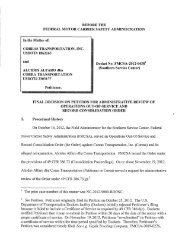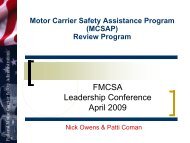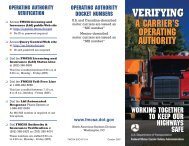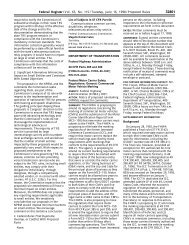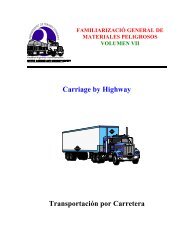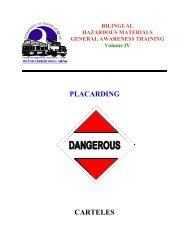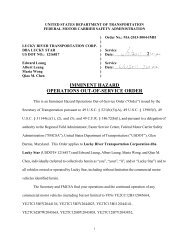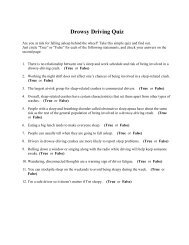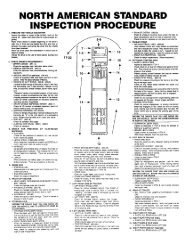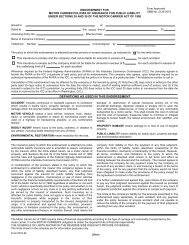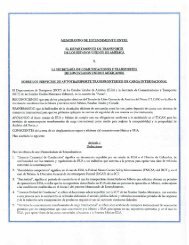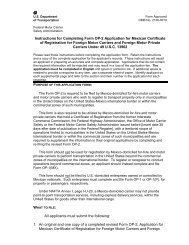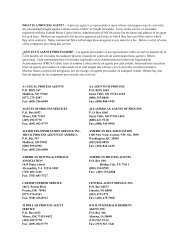Dear Sir/Madam - Federal Motor Carrier Safety Administration
Dear Sir/Madam - Federal Motor Carrier Safety Administration
Dear Sir/Madam - Federal Motor Carrier Safety Administration
Create successful ePaper yourself
Turn your PDF publications into a flip-book with our unique Google optimized e-Paper software.
<strong>Federal</strong> Register / Vol. 69, No. 161 / Friday, August 20, 2004 / Rules and Regulations 51597<br />
and determined that it does not have a<br />
significant economic impact on a<br />
substantial number of small entities. As<br />
discussed in the section above, this rule<br />
adopts interim regulations concerning<br />
requests for waivers, applications for<br />
exemptions from the FMCSRs, and the<br />
initiation and administration of pilot<br />
programs. The provisions concerning<br />
waivers and exemptions will be<br />
especially beneficial to small entities,<br />
since these entities may be more in need<br />
of regulatory relief than larger<br />
companies. The regulations were<br />
written in question-and-answer format<br />
using plain language to help ensure that<br />
small entities understand how to<br />
request a waiver and apply for an<br />
exemption, and how the agency will<br />
handle such requests and applications.<br />
The provisions concerning pilot<br />
programs are likely to be less beneficial<br />
to small entities. Pilot programs would<br />
generally require a large number of<br />
participating motor carriers and drivers<br />
willing to operate under identical terms<br />
and conditions. By contrast, waivers<br />
and exemptions may be carrier- or<br />
driver-specific and therefore better<br />
suited to the needs of small entities. As<br />
with the IFR, this final rule does not<br />
require small entities to take any actions<br />
unless they request a waiver, apply for<br />
an exemption, or participate in a pilot<br />
program. The information that would be<br />
required for a waiver or an exemption<br />
has been kept to a minimum. For this<br />
reason, FMCSA certifies this final action<br />
will not have a significant economic<br />
impact on a substantial number of small<br />
entities.<br />
Paperwork Reduction Act<br />
The Paperwork Reduction Act of 1995<br />
[44 U.S.C. 3501 et seq.] does not apply,<br />
because this final rule does not contain<br />
information collection requirements<br />
subject to Office of Management and<br />
Budget (OMB) approval. However,<br />
waivers, exemptions, and pilot<br />
programs include certain information<br />
collection requirements as part of the<br />
terms and conditions for the regulatory<br />
relief granted. In addition, the agency is<br />
required by section 4007 of TEA–21 to<br />
monitor the implementation of<br />
exemptions to ensure compliance with<br />
the terms and conditions, and to ensure<br />
sufficient recordkeeping by participants<br />
in pilot programs to facilitate the<br />
collection and analysis of data.<br />
Therefore, FMCSA will consider the<br />
information collection requirements for<br />
any special recordkeeping requirements<br />
associated with the waiver, exemption,<br />
or pilot program, and, if necessary,<br />
request approval from OMB.<br />
National Environmental Policy Act<br />
(NEPA)<br />
The agency has analyzed this action<br />
for the purpose of the National<br />
Environmental Policy Act of 1969<br />
(NEPA) (42 U.S.C. 4321 et seq.). We<br />
have determined under our<br />
environmental procedures Order 5610.1,<br />
published on March 1, 2004, that this<br />
action is categorically excluded (CE)<br />
under Appendix 2, paragraph 6(b.) of<br />
the Order from further environmental<br />
documentation. This CE relates to<br />
regulations describing FMCSA’s<br />
procedures that persons applying for a<br />
waiver, requesting an exemption, and<br />
proposing a pilot program must follow.<br />
The regulations also explain what<br />
procedures FMCSA will use to evaluate<br />
the waiver application, exemption<br />
request, or proposed pilot program,<br />
including notifying the public, for the<br />
purpose of ensuring transportation<br />
safety. In addition, the agency has<br />
determined that the action includes no<br />
extraordinary circumstances that would<br />
have any effect on the quality of the<br />
environment. Thus, the action does not<br />
require an environmental impact<br />
statement.<br />
We have also analyzed this action<br />
under the Clean Air Act, as amended<br />
(CAA) section 176(c), (42 U.S.C. 7401 et<br />
seq.) and implementing regulations<br />
promulgated by the Environmental<br />
Protection Agency. We have determined<br />
that approval of this action is exempt<br />
from the CAA’s General Conformity<br />
requirement since it pertains only to<br />
requirements persons must follow to<br />
request waivers and exemptions from<br />
the FMCSRs, and sets forth procedures<br />
the FMCSA will use to process these<br />
requests for waivers, applications for<br />
exemptions and those to initiate pilot<br />
programs. We also determined that this<br />
action will not result in any emissions<br />
increase, nor will it have any potential<br />
to result in emissions that are above the<br />
general conformity rule’s minimum<br />
emission threshold levels. Moreover, it<br />
is reasonably foreseeable that the rule<br />
will not increase total commercial motor<br />
vehicle mileage, change the routing of<br />
commercial motor vehicles, how<br />
commercial motor vehicles operate or<br />
the commercial motor vehicle fleet-mix<br />
of motor carriers.<br />
Energy Supply, Distribution, or Use<br />
The FMCSA has analyzed this action<br />
under Executive Order 13211, Actions<br />
Concerning Regulations That<br />
Significantly Affect Energy Supply,<br />
Distribution, or Use. We have<br />
determined that it is not a ‘‘significant<br />
energy action,’’ because it is not a<br />
significant regulatory action under<br />
VerDate jul2003 15:27 Aug 19, 2004 Jkt 203001 PO 00000 Frm 00051 Fmt 4700 Sfmt 4700 E:\FR\FM\20AUR1.SGM 20AUR1<br />
Executive Order 12866, and it is not<br />
likely to have a significant adverse effect<br />
on the supply, distribution, or use of<br />
energy.<br />
Unfunded Mandates Reform Act<br />
Title II of the Unfunded Mandates<br />
Reform Act of 1995 requires each<br />
<strong>Federal</strong> agency to prepare a written<br />
statement assessing the effects of any<br />
<strong>Federal</strong> mandate in a proposed or final<br />
rule that may result in an expenditure<br />
of $100 million or more (adjusted<br />
annually for inflation) in any one year<br />
by State, local, and tribal governments,<br />
in the aggregate, or by the private sector.<br />
This final rule does not contain such a<br />
mandate, and the requirements of Title<br />
II do not apply.<br />
Civil Justice Reform<br />
We reviewed this rule under<br />
Executive Order 12988, Civil Justice<br />
Reform, and determined it meets<br />
applicable standards to minimize<br />
litigation, eliminate ambiguity, and<br />
reduce burden.<br />
Protection of Children<br />
We analyzed this rule under<br />
Executive Order 13045, Protection of<br />
Children From Environmental Health<br />
Risks and<strong>Safety</strong> Risks. This rule is not<br />
economically significant and does not<br />
concern an environmental risk to the<br />
health or safety of children.<br />
Taking of Private Property<br />
FMCSA certifies that this rule will not<br />
affect a taking of private property or<br />
otherwise involve taking implications,<br />
under Executive Order 12630,<br />
Governmental Actions and Interference<br />
with Constitutionally ProtectedProperty<br />
Rights.<br />
Intergovernmental Review of <strong>Federal</strong><br />
Programs<br />
Catalog of <strong>Federal</strong> Domestic<br />
Assistance Program Number 20.217,<br />
<strong>Motor</strong> <strong>Carrier</strong> <strong>Safety</strong>. Regulations<br />
implementing Executive Order 12372<br />
regarding intergovernmental<br />
consultation on <strong>Federal</strong> programs and<br />
activities do not apply to this program.<br />
<strong>Federal</strong>ism<br />
FMCSA has analyzed this final rule in<br />
accordance with the principles and<br />
criteria contained in Executive Order<br />
13132 (<strong>Federal</strong>ism). We have<br />
determined that this rule does not have<br />
a substantial direct effect on States, nor<br />
would it limit the policymaking<br />
discretion of the States. Nothing in this<br />
document preempts any State law or<br />
regulation.<br />
Although the rule itself does not<br />
preempt State and local laws and



